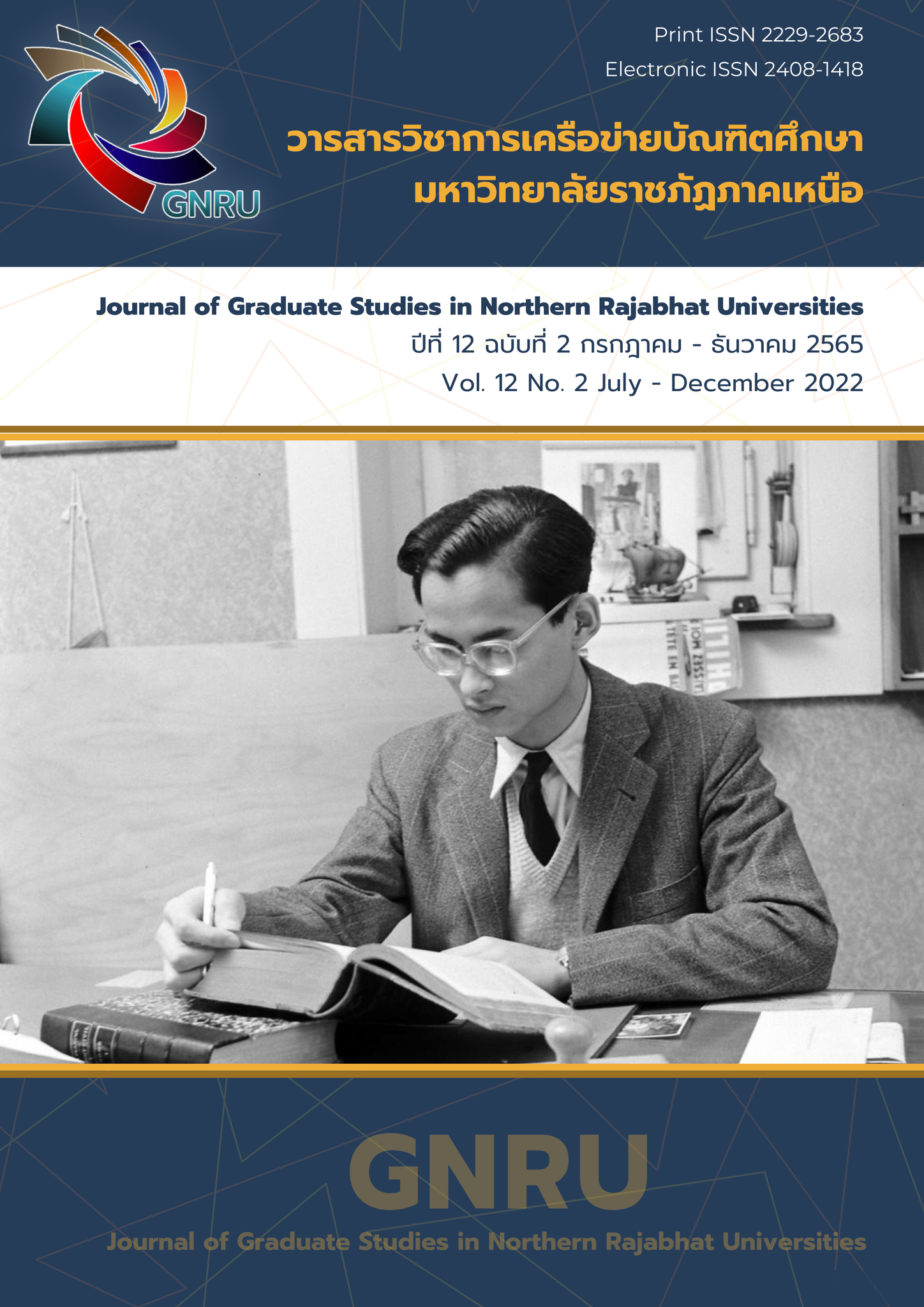Development of a Learning Process in History, Art, Culture and Wisdom of the Ethnic Groups in Nakhon Sawan Province by Using Community Base for Enhancing the Learner Competency in the 21st Century
Main Article Content
Abstract
This research objectives were 1) to create a community-based learning management plan for the history, arts, culture, and local wisdom of the ethnic groups, 2) to develop the learning process of history, arts, culture, and local wisdom of the ethnic groups, and 3) to evaluate the learning outcomes of history, arts, culture and local wisdom of the ethnic groups. The target group was a purposive selection, consisting of 20 representatives of the ethnic groups, 100 school administrators, teachers, and students. The data were collected by employing 1) an interview form, 2) a suitability assessment form, 3) a behavior and learning process assessment form, 4) a learning achievement form, and 5) an opinion questionnaire and analyzed by using percentage, mean, standard deviation and descriptive data analysis. The results showed that: 1) Creating a learning management plan for learning history, arts, culture, and local wisdom of the ethnic groups comprised a total of 5 topics: Lao Ethnic Group, Mon Ethnic Group, Vietnamese Ethnic Group, Muslim ethnic groups, and Chinese ethnic groups, overall, it was at a high level of suitability quality. 2) The development of the learning process of history, arts, culture, and local wisdom of the ethnic groups was found that the students had a collaborative learning process, the process of seeking knowledge group, group process, building their own knowledge, learning from media, a source of learning and local wisdom, having learning skills, cooperation skills, communication skills, creative and innovative skills, information skills, media and technology, life and career skills. 3) The evaluation of learning history, arts, culture, and local wisdom of the ethnic groups found that students had overall learning achievements with a mean score of 20.30, representing 67.68% and the students had their opinions on the community-based learning management overall with at a high level.
Article Details
References
กล้า ทองขาว. (2550). การจัดการศึกษาฐานชุมชน. กรุงเทพฯ: มหาวิทยาลัยธุรกิจบัณฑิตย์.
_______. (2561). การจัดการศึกษาฐานชุมชน (Community-based Education Management =CBEM).
สืบค้นเมื่อ 14 กุมภาพันธ์ 2564, จาก www.dpu.ac.th/ces/download.php?file name=1377584927.docx.
จงกลณี ภัทรกังวาน. (2561). การศึกษาพฤติกรรมการวางแผน เรื่อง การจัดการสิ่งแวดล้อมสำหรับนักเรียนชั้นมัธยมศึกษาปีที่ 6 ด้วยการจัดการเรียนรู้โดยใช้ชุมชนเป็นฐาน.วิทยานิพนธ์ปริญญาศึกษาศาสตรมหาบัณฑิต สาขาการสอนสังคมศึกษา มหาวิทยาลัยศิลปากร.
จิราภา เต็งไตรรัตน์.(2554). จิตวิทยาทั่วไป.(พิมพ์ครั้งที่ 7). กรุงเทพฯ: สำนักพิมพ์มหาวิทยาลัยธรรมศาสตร์.
ดิษยุทธ์ บัวจูม, อังศินันท์ อินทรกำแหง, พรรณี บุญประกอบ และคนอื่น ๆ. (2014). การพัฒนารูปแบบ
การจัดการเรียนรู้โดยใช้ชุมชนเป็นฐาน เพื่อสร้างความสนใจและทักษะในอาชีพท้องถิ่นของนักเรียนโรงเรียนบ้านพะแนงวิทยา. Journal of Behavioral Science, 2(20), 18 - 36.
พูลจิต หลี่อินทร์. (2556). การพัฒนาหน่วยการเรียนรู้บูรณาการ เรื่อง วัฒนธรรม ประเพณี ในท้องถิ่น โดยใช้แหล่งเรียนรู้ภูมิปัญญาท้องถิ่นสาหรับนักเรียนชั้นประถมศึกษาปีที่ 5 โรงเรียนชุมชนหนองเม็ก. วิทยานิพนธ์ปริญญาศึกษาศาสตรมหาบัณฑิต สาขาหลักสูตรและการสอน มหาวิทยาลัยขอนแก่น.
เยาวเรศ ภักดีจิตร. (2565). การพัฒนาหน่วยการเรียนรู้ท้องถิ่นบนฐานนครสวรรค์ศึกษาด้วยการจัดการเรียนรู้โดยใช้ชุมชนเป็นฐานเพื่อพัฒนากระบวนการเรียนรู้ของผู้เรียนในศตวรรษที่ 21 สู่การส่งเสริมการท่องเที่ยวเชิงวัฒนธรรม.วารสารวิชาการและสังคมศาสตร์, 17(1), 61-76.
เยาวเรศ ภักดีจิตร และคณะ. (2562). การพัฒนากระบวนการเรียนรู้เรื่องราวทางศิลปะ วัฒนธรรม ภูมิปัญญาท้องถิ่นของผู้เรียนเพื่อส่งเสริมการท่องเที่ยวเชิง วัฒนธรรมโดยชุมชนมีส่วนร่วม ในเขตลุ่มแม่น้ำสะแกกรัง จังหวัดอุทัยธานี. วารสารครุศาสตร์ คณะครุศาสตร์ มหาวิทยาลัยราชภัฏนครสวรรค์, 2(1), 17–30.
วิจารณ์ พานิช. (2555). วิถีสร้างการเรียนรู้เพื่อศิษย์ในศตวรรษที่ 21. กรุงเทพฯ: มูลนิธิสดศรี-สฤษดิ์วงศ์.
_______. (2557). นวัตกรรมสู่การเป็นประเทศแห่งการศึกษา. สืบค้นเมื่อ 14 กุมภาพันธ์ 2564,
จาก https://www.gotoknow.org/posts/565909.
วิไลภรณ์ ฤทธิคุปต์. (2560). การจัดการเรียนรู้โดยใช้ชุมชนเป็นฐาน: กลยุทธ์การจัดการเรียนรู้ที่มีประสิทธิภาพของครูในศตวรรษที่ 21. วารสารบัณฑิตศึกษา มหาวิทยาลัยราชภัฏเชียงราย, 11(3), 179-191.
ศศิพัชร จำปา. (2559). การพัฒนารูปแบบการจัดการเรียนรู้ประวัติศาสตร์ท้องถิ่นโดยใช้แหล่งเรียนรู้ทางประวัติศาสตร์ เพื่อส่งเสริมกระบวนการคิดทางประวัติศาสตร์. Veridian E-Journal,Silpakorn University, 9(2), 1158–1171.
ศรีวรรณ ฉัตรสุริยวงศ์. (2557). กระบวนทัศน์การจัดการเรียนรู้โดยใช้ชุมชนเป็นฐานเพื่อส่งเสริมความสามารถ ด้านการคิดอย่างมีวิจารณญาณและการแก้ปัญหาเชิงสร้างสรรค์สำหรับนักเรียนระดับประถมศึกษา. วิทยานิพนธ์ปริญญาปรัชญาดุษฎีบัณฑิต สาขาวิชาหลักสูตรและการสอน มหาวิทยาลัยศิลปากร.
สุชาติ แสงทอง. (2557). การสังเคราะห์ตัวแบบความหลากหลายทางวัฒนธรรมสุขภาพชุมชนสู่การประยุกต์ใช้อย่างยั่งยืน. นครสวรรค์: สำนักศิลปะและวัฒนธรรม มหาวิทยาลัยราชภัฏนครสวรรค์.
สุรางค์ โค้วตระกูล. (2553). จิตวิทยาการศึกษา. (พิมพ์ครั้งที่ 9). กรุงเทพฯ: สำนักพิมพ์แห่งจุฬาลงกรณ์
มหาวิทยาลัย.
Bednar, S. and Simpson, N. B. (2013, December). Incorporating community-based learning in a
course on the economics of poverty. Retrieved on February 14, 2020, from
https://www.aeaweb.org/conference/2014/retrieve.php?pdfid=214
Bedri, Z,de Frein, R. and Dowling, G.(2017, December 18).Community-based learning : A primer.
Irish Journal of Academic Practice, 6(1), Retrieved on February 14, 2020, from
https://arrow.dit.ie/ijap/vol6/iss1/5.
Melaville, A, Berg, A. C. and Blank M. J. (2015, May 20). Community-based learning :Engaging
students for success and citizenship. Partnerships/Community. Paper 40. Retrieved on
February 14, 2020, from http://digitalcommons.unomaha.edu/slcepartnerships/40.
Saavedra, A. R. and Opfer, V. D. (2012, April). Teaching and learning 21st century skills :
Lessons from the learning sciences. Asia Society, Retrieved on February 14, 2020,
from https://asiasociety.org/education/teaching-and learning-21st-century-skills


